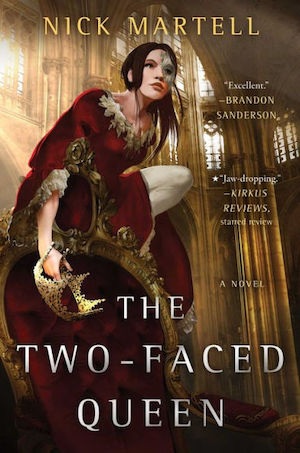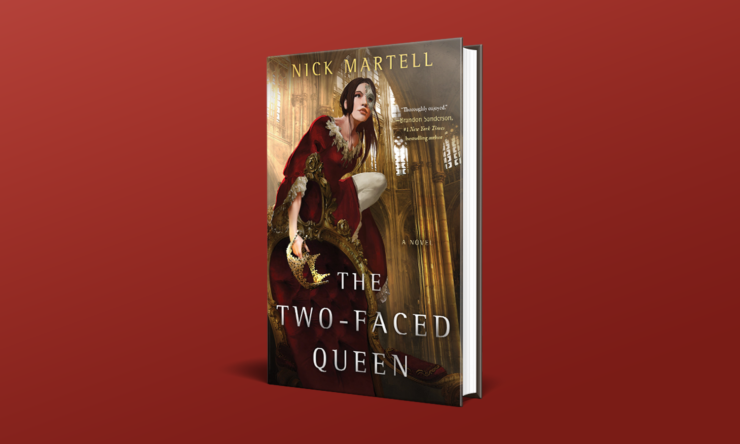In Kingdom of Liars, we were introduced to Michael Kingsman, he and his family fallen far from power and favor, and the story of a family, a person, on the outs of power and society whilst being an integral fixture in the power structures. Kingdom of Liars told a relatively self contained mobius strip of a story that explained how Michael became accused and marked as the killer of a King.
Following up on such a bottled narrative is difficult even if there are plenty of questions left—what now, with the King dead, both nobles of the family out for his blood, and the revelations of his own life lifted and laid bare? What can Michael do, having been shoved into the position that he has been by the end of Kingdom of Liars? Nick Martell’s The Two-Faced Queen ponders these questions, and continues to explore the story of Michael Kingsman.
The first novel had that mobius strip of a narrative to drive the reader forward, the constant pull of “well how DID Michael get from here to the ending we already know”. Martell doesn’t try that trick here again. Instead, the narrative goes for a more traditional linear format. With a lot of balls in motion, there is no lack of “what now?” questions—how does Michael deal with the fact that everyone thinks he killed the King? Even as he tries to piece his family back together, how do they handle this stress of the situation? The rebels are still outside the gates. Michael’s “savior” is as much a problem as a solution to him not dying, and not one that necessarily can be trusted.
And then there is the titular character of the novel. The so-called Two-Faced Queen (an epithet that is in text as well as the book’s title), Serena, is the Heir Apparent. And here I want to discuss the cover of the book, if you will indulge me. Take a look at the US cover: a royal hall is the setting, and we have, in an active, almost child like pose with the bent knee, the titular Two-Faced Queen. Hand casually grasping the crown, face only half of flesh. She’s staring at someone, and given the power and feel of capriciousness on the part of the subject, not someone you want to meet. Not an anarchist Joker-like character, but one who definitely acts on whims as much as plans, and all the more dangerous for it.
Buy the Book


The Two-Faced Queen
And yet for all that, for her righteous anger at Michael and her attempts to make him pay, (there is a wonderful set piece with Michael on the run from the Ravens after Serena sets them on him, just one example of their interactions), there is a long history between Michael and Serena, and the novel leverages that to make the relationship and interactions between them complicated on both sides. If Kingdom of Liars was about Michael learning about a lost part of his past, and getting entangled into a long running plot in the process, this second novel is working out those consequences and revisiting that past. And, deciding on what to do.
And that really seems to be an overriding theme of this novel, maybe even the entire series (we’ll see about the third novel). The whole idea of Fabrications, the magic system that dominates the city, and the cost of magic being memories really runs the rail of what this novel is trying to do. But when the magic eats memories, both short and long term, there are questions of who and what people are and whether they can be whole if chunks of what they remember are gone. I kept thinking of Gene Wolfe’s Soldier of Sidon series throughout this novel. Latro would completely grok the quandary and problems that magic users in Martell’s city deal with. There is a great bit where Michael’s attempts to learn more about his Fabrication and how it works costs him the entire day of memories, enough to launch him blind into subsequent events that he set in motion and prepared for. So not only is Gene Wolfe a touchstone for me in Michael’s story, but also Philip K. Dick:
Kuato : What do you want, Mr. Quaid?
Douglas Quaid : The same as you; to remember.
Kuato : But why?
Douglas Quaid : To be myself again.
Kuato : You are what you do. A man is defined by his actions, not his memory.
We see this thesis at work with Michael’s friend Dawn, who uses her fabrications in order to escape a life bound by her disabled body. Michael and Dawn argue and debate the merits of Dawn using Fabrications in order to have a life, because of the inevitability that she will lose enough of her memories to become an invalid Forgotten. Dawn insists that it is her choice and her right to have the life she wants, even if it is a shortened one. It’s the classic “Achilles Choice” and Dawn clearly comes down on the side of Kuato in that it is what she does, the life that she lives, that really defines who and what she is. She’s willing to pay the memory costs of that, as high as they are. It is a real counterpoint to Michael’s chase in the first novel to learn about a deliberately created gap in his memories, his actions driving toward trying to regain those memories. Who is right? Michael? Dawn? Neither? Both?
The whole Michael-Serena strand in the novel, as dominant and titular as it is, is just one chord in this novel of memory, magic and conflicts. The rebels are STILL outside of the walls, and the Apocalypse World doom clock of their plan does advance. Just what Dark the Mercenary (whom Michael is now apprenticed to) has for his plans is unclear. His family is still struggling with all the pressures from within and without. And, oh yes, a serial killer is on the loose, one with a long history in the city and amazingly dangerous. Combined with a lack of the tight structure of the first novel, this can lead the second novel to be a bit of a ricochet between various problems and plots pulling Michael to and fro. Sometimes, this lacks cohesion but fortunately these interludes are brief, because indeed a lot is going on and events keep ticking. Neither Michael nor events in the book can tread water long. Too many forces in the novel have too many plots and schemes to keep things tranquil ever for long. It does lead to a Gambit pileup, although Michael is far less of a chew toy here.
As a character, Michael is less awful than in the first novel, and is more sympathetic and understandable. Kingdom of Liars had Michael as victim, turning into a character with agency, but also unpleasant to be around. In Two-Faced Queen, Michael is no less driven and he hasn’t mellowed out, but there is more nuance and sympathy for him, his life, and his position. This goes on a number of axles—his relationship with his family, with Serena, with Dawn, and some of the mistakes and tribulations of the first book. It humanizes the magnificent bastard and further deepens and complicates his narrative. I am not sure that I’d invite Michael to dinner, but like Symon the Historian, his life story sure is fascinating enough to follow. The changes brought on Michael are the real engine for the narrative.
And that is really where this novel shines. Sure, we get a heck of a lot more depth on the world—information on Mercenary companies, on politics, on the Kingsman family history, and on magic, particularly. Fabrications, as it turns out, are just the beginning of what magic can do. Having a character who is really tied to his home city, has been absolutely clueless on a lot of things, including Fabrications, and a widening myopic viewpoint means that the reader can learn and figure out things as Michael does. It’s focused and distilled through Michael, and aside from a couple of different point of view interludes, the point of view is solely through Michael. Bearing in mind his memory, recollection and his own mental agenda are questionable, the reader is left in a spot that, as mentioned above, feels like something like PKD and Wolfe teaming up to write City State Fantasy . The secrets, lies, betrayals (including to himself) all make for a read that is one to pay attention to. This is a thick book, but not a wall of words read by any means where you can glaze over things. Again, Wolfe is your model here.
Mind you, this is all written with an eye towards modern sensibilities. Female soldiers in plate mail. Normalization of queer relationships. Interrogations of power and who has it and what it is used for, and who suffers under it. Even for a novel that wraps around a future Queen, her brother and the premiere noble family in the city, the presence of leveling influences like the Mercenaries, the rebels outside, and the plight of the poor of the city all come in. It’s a rich tapestry of a city that is careening toward the brink of disaster , and it is all for Michael to do to try and guide the direction toward the edge. We will see, in book three, if he can keep himself, and the city he loves, from going over that edge. Or even just saving himself and those he cares about. I look forward to finding out. Martell has done the bottle narrative and the more linear narrative. I am enthused to see what he pulls out for book three.
The Two-Faced Queen is available from Gallery / Saga Press.
An ex-pat New Yorker living in Minnesota, Paul Weimer has been reading sci-fi and fantasy for over 30 years. An avid and enthusiastic amateur photographer, blogger and podcaster, Paul primarily contributes to the Skiffy and Fanty Show as blogger and podcaster, and the SFF Audio podcast. If you’ve spent any time reading about SFF online, you’ve probably read one of his blog comments or tweets (he’s @PrinceJvstin).










